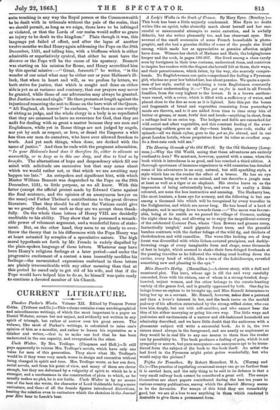A Lady's Walks in the South of France. By Mary
Eyre. (Bentley.)— This book has been a little unjustly condemned. Miss Eyre no doubt writes like an egoist, talks absurdly mach about herself and her suc- cessful or unsuccessful attempts to resist extortion, and is awfully didactic, but she writes pleasantly too, and has observant eyes. Her account of the small economies of some French households is photo- graphic, and she had a genuine dislike of some of the people she lived among, which made her as appreciative as genuine affection might have done. Witness her sketch of Madame and Marie, the lodginghouse keeper and the cook, in pages 196-207. She lived among a class rarely seen by foreigners in their true costume, understood them, and contrives to inspire her readers with the disgust she herself felt at them, their ways, and their penuriousness, which latter, by the way, she scarcely compre- hends. No Englishwoman can quite comprehend the feeling a Pyrenean girl, who has no poor law behind her, has about pennies. We quote a speci- men of her style, useful as explaining a term Englishmen constantly use without understanding it :—" The pot au feu is used in all French families, from the very highest to the lowest. It is a brown earthen- ware vessel, with a cover, which is filled with a sufficiency of water, and placed close to the fire as soon as it is lighted. Into this pot the bones and fragments of bread and vegetables remaining from yesterday's meals are thrown, and to it are added from time to time stray bits of butter or grease, or meat, fowls' feet and heads—anything in short, from a cabbage leaf to an onion top. The hedges and fields are ransacked for wild sorrel and other vegetables, and this constant feeding of the ever- simmering caldron goes on all day—bean husks, peas cods, stalks of spinach—all we think refuse, goes to the pot au feu abroad, and in our great London hotels, whose proprietors know its value as excellent soup. So a first-rate cook told me."






























 Previous page
Previous page